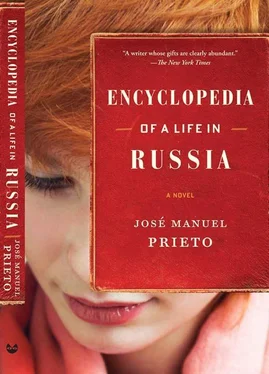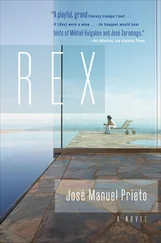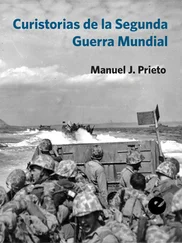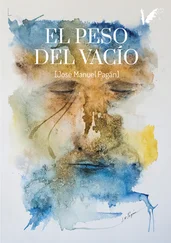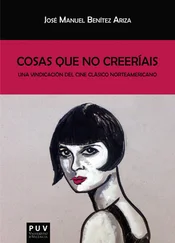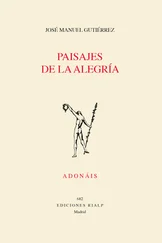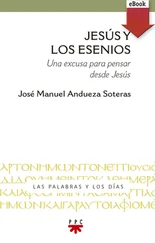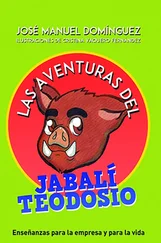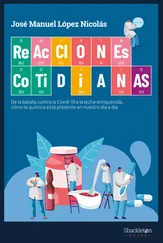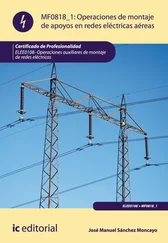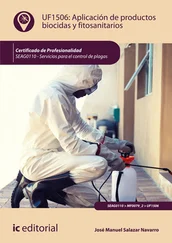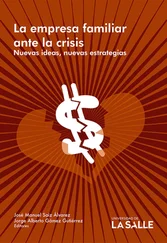PASARELA ( or CATWALK). Here’s the final speech I managed to deliver on the roof of our hotel in YALTA, as filmed by LINDA. A very slow pan takes in the depth of the sky, a flotilla of cirrus riding out over the sea. A serene introductory moment, flooded with light, for by then we believed the danger was past and we were safe from the jaws of the ravenous pack, the bolt securely drawn.
I watch myself balance along the edge of the roof and come to a halt. With my back to LINDA, I study the landscape, the beauty of the view that expands in my lungs. I turn to the camera, arm extended, and say something we cannot hear, the beginning of a last discourse of farewell to the summer, the beautiful view, the play of shadows at twilight, words that fall into the void and die without being registered, because of some defect in the camera or some carelessness on the part of LINDA, who may have neglected to engage the sound button, I will never know.
It was my last lecture of the summer. I don’t recall a single point I made in this “presentation,” which now, owing to its muteness, has taken on far greater force than all the others I delivered that summer for — as I’d explained to LINDA — the truly wise teacher “preaches the doctrine without words.” I began with a broad circumlocution, addressing — or so it would appear — general definitions: the sun on the line of the horizon, the blue sea, the vastness my open arms sought to embrace. Then, rejecting the vague imprecision of the landscape, the natural order, my right hand sketched a circle of light around myself, the contour of the soles of my feet, my personal world. With my palm turned upward, fingers wide, I reviewed my clothing, the impeccable crease of my pants, the thick silk tie. This resplendent attire clearly demonstrated the immense sense of well-being that could be extracted from the neutral material of a few bodies, a summer like any other. I gave signs of satisfaction. My lips pronounced a single word three or four times, a word that, when I first watched the video, I couldn’t decipher. Until it dawned on me that I was speaking in Russian. Then I understood: “Хорошó!” “ Horosho! Horosho !” (“Good! Perfect!”)
An affirmation followed by an ample parenthesis of my hands, my fingers, touching each other at the pads, outlining the shape of a narrow cell, the slope of a roof. My brows respond with astonishment, I close my eyes. . my mouth emits sounds of indignation with particular emphasis on the letters o and z . I speak without pausing for breath (now seated on the parapet). The bleary look in my eyes betrays the fact that I am on the verge of a serious bout of blindness. During a pause I see myself raise my head and rub my temples desperately, my eyesight gone. Very little illumination reaches the rooftop by now, only the oblique light of a sun slowly sinking. The white blur that is my shirtfront appears at evenly spaced intervals when I lean forward to underscore a phrase or stretch my chin away from my throat so that my words — highly profound sentences, important conclusions — can reach LINDA on the opposite parapet, from where she is filming me. The light’s fluctuation now seems rhythmic, imbued with unmistakable significance, and at a given moment it speeds up as if announcing the imminent advent of the tragedy, endowing the scene that will soon erupt with its desperate tempo.
My face undergoes an earthquake: I give a start, one, two, three times as the air transports the vibrations of a hail of kicks against the trapdoor. RUDI’S men have taken a long time to appear, but here they are, come to attack me and steal all my money. I stand and walk toward the camera but LINDA pans away for a second and we see the trapdoor jumping. Then comes the eruption, a black substance spewing forth. Five portions of magma, all in a state of inexplicable fury.
Then I reappear standing on the parapet. I slap my chest and let out a yell I have no trouble deciphering. “Over here, RUDI!” A move designed to distract him from LINDA. I pick up the bouquet of carnations and walk away, balancing along the narrow wall. Then I turn and offer the thugs a scowl of deepest disdain. I extend my right hand and hang a text in the air (as in one of La Khalodnaya’s silent films), a text that shines white against the deep blue of the sky: “One more step and I’ll jump!” These five little men (one of them wielding an AX) stop in their tracks, terrified: my suicide would greatly complicate their flight across the snowy mountains of the Caucasus. While their surprise lasts, I pretend to weigh my options and, finally, make a gesture of reconciliation: “We could reach an agreement, gospada. ” I lower my eyes, arrange my face in an expression of resignation, and slowly take out my wallet. I make a show of counting the amount of our costly ransom, but suddenly straighten triumphantly, fling all my credit cards at them and shout: “No cash at all, muchachos .” Which I followed with a gale of Homeric laughter, a final ray of sun glinting against the barrier of my teeth.
Now I can confess: I’d decided to die, put an end to the suffering caused by seeing so deeply, having so full an awareness of the unbearable beauty of the world. I’d managed to conceal from LINDA the constant attacks of my malady, when the world fell apart into gems and quartzes whose BRILLIANT CORNERS I studied, entranced and blinded by their gleam. And now, on this rooftop, it no longer mattered to me whether I died, whether I threw myself into the abyss like a Hyperborean (see EURASIA, Pliny’s notes) committing suicide after a life of excess. Neither the success of my experiment nor the love that, I could almost swear, I’d been able to awaken in LINDA, had managed to calm my despair, alleviate my fleshly existence, halt the course of my sickness. There, at the edge of the parapet, two steps away from the ravenous pack that was gaping at my credit cards without yet understanding a thing, I turned to LINDA to say good-bye. I see myself raising my eyes, seeking some motive that will explain my decision, pointing my index finger toward the sky, opening my mouth to emit a first phrase — the all-important fact, the new line of discourse we decide to embark on when we suddenly realize we’ve wasted two-thirds of the allotted time, and we organize our thoughts, take a deep breath, the central thesis blazing in our mind—“Listen, LINDA, the notion. .” and then I begin to blur, affected by an actual earthquake, furrows of fire that shoot across my face: LINDA, who at that moment throws down the camera and bolts for the trapdoor. Apparently, the fall activated the sound button. It’s the last thing the camera recorded: my image, vanishing, and a cry that now fills me with joy and sadness: “THELONIOUS, jump!”
(The real world is naught but appearance. If we continue to have some sort of objective existence when our eyes are closed it’s only because we’re imagined by a being, a BOGATYR, asleep outstretched in a field, head resting on a hummock. He is the last bastion, the final dream that contains us all. LINDA’S cry, almost a scream, made him crack open an eye, blink for a second, and then o dark dark dark they all go into the dark: me, LINDA, RUDI, YALTA, Russia, immensity itself, all go into the dark.)
PETER I (пэтэр I). The tyrant indispensible to Muscovy’s enormity. A man of wide-ranging temperament — a Russian — he spent several years as an apprentice carpenter in Zealand, caulking the Russian Navy’s first ships. His indisputable talent earns him the same indulgent treatment as the drunken master craftsmen who plague the IMPERIUM’S factories: he’s accepted as an irremediable affliction, “very much our own.” Saint Petersburg, for example, the resplendent Germanic city he founded on the unhealthy and shifting delta of the Neva, стоит на костях ( stoit na kostiah ), that is, took root upon the bones of many thousands of Russian muzhiks. Figuratively, of course: but when I heard this terrible accusation for the first time I thought PETER had given the order to fill in the delta’s sandbanks with the corpses of the builders — the technique used by the Ch’in for the Great Wall.
Читать дальше
